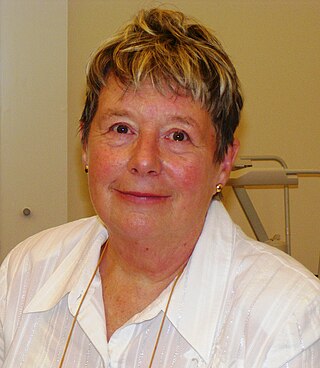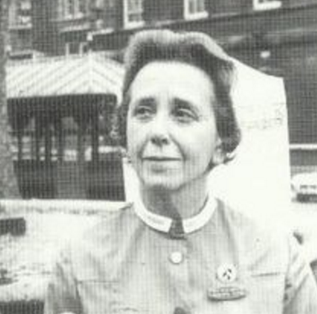Related Research Articles

The Royal College of Nursing (RCN) is a registered trade union in the United Kingdom for those in the profession of nursing. It was founded in 1916 as the College of Nursing, receiving its royal charter in 1928. Queen Elizabeth II was the patron until her death in 2022. The majority of members are registered nurses; however student nurses and healthcare assistants are also members. There is also a category of membership, at a reduced cost, for retired people.
Health visitors are professional individuals engaged in public health work within the domestic setting, predominantly found in countries with state-funded health systems. They are distinct from district nurses, who provide clinical healthcare, domestically.

Dame Margaret June Clark, FAANFLSW is Professor Emeritus of Community Nursing, at Swansea University in Wales.
Nursing in the United Kingdom has a long history. The current form of nursing is often considered as beginning with Florence Nightingale who pioneered modern nursing. Nightingale initiated formal schools of nursing in the United Kingdom in the late 19th and early 20th centuries. The role and perception of nursing has dramatically changed from that of a handmaiden to the doctor to professionals in their own right. There are over 700,000 nurses in the United Kingdom and they work in a variety of settings, such as hospitals, health centres, nursing homes, hospices, communities, military, prisons, and academia, with most working for the National Health Service (NHS). Nurses work across all demographics and requirements of the public: adults, children, mental health, and learning disability. Nurses work in a range of specialties from the broad areas of medicine, surgery, theatres, and investigative sciences such as imaging. Nurses also work in large areas of sub-specialities such as respiratory, diabetes, cancer, neurology, infectious diseases, liver, research, cardiac, women's health, sexual health, emergency and acute care, gastrointestinal, infection prevention and control, neuroscience, ophthalmic, pain and palliative, and rheumatology. Nurses often work in multi-disciplinary teams but increasingly are found working independently.
Dame Phyllis Muriel Friend, was a British nurse and nursing officer.

Dame Alicia Frances Jane Lloyd Still, was a British nurse, teacher, hospital matron and leader of her profession. She was one of the leaders in the campaign for state registration of nurses. Following the Nurses Registration Act 1919, she was a member of the General Nursing Council (1920-1937). As chairwoman of the General Nursing Council's first Education and Examinations Committee she helped establish the first national examination standards for the registration of nurses.
Theodora Turner, was a British nurse and hospital matron.
Annie Therese Altschul, CBE, BA, MSc, RGN, RMN, RNT, FRCN was Britain's first mental health nurse pioneer; a midwife, researcher, educator, author and a patient advocate, emeritus professor of nursing.

Dame Anne Marie Rafferty FRCN is a British nurse, academic and researcher. She is professor of nursing policy and former dean of the Florence Nightingale Faculty of Nursing, Midwifery and Palliative Care at King's College London. She served as President of the Royal College of Nursing from 2019 to 2021.
The history of nursing in the United Kingdom relates to the development of the profession since the 1850s. The history of nursing itself dates back to ancient history, when the sick were cared for in temples and places of worship. In the early Christian era, nursing in the United Kingdom was undertaken by certain women in the Christian Church, their services being extended to patients in their homes. These women had no real training by today's standards, but experience taught them valuable skills, especially in the use of herbs and folk drugs, and some gained fame as the physicians of their era. Remnants of the religious nature of nurses remains in Britain today, especially with the retention of the job title "Sister" for a senior female nurse.

Winifred Emily Hector FRCN was an English nurse and textbook author. She played a significant part in introducing modern curriculum and teaching methods to British nursing education.
Nursing Studies is an academic unit within the School of Health in Social Science at University of Edinburgh. A teaching unit was established in 1956, the first to be part of a British university. The unit's initial focus was on education for nursing teachers and leaders. In 1960 it offered the first degree courses in nursing in the UK. It became a department of the university in 1965 and six years later gained a Chair of Nursing Studies, which was the first to be established in Europe. The unit also had a Nursing Research Unit, which opened in 1971 and ran for more than twenty years. The unit continues to offer nurse education at undergraduate, postgraduate and research levels.
Lisbeth Hockey was an Austrian-born British nurse and researcher. She was the first director of the Nursing Research Unit in Edinburgh. She was awarded a PhD for research in nursing, one of the first people to do so.
Barbara Noel Fawkes was a British nurse and nursing educator. She served as Chief Education Officer, General Nursing Council for England and Wales from 1959 to 1974.
Sheila Margaret Collins OBE FRCN was a British nurse, writer and educationist. She was chair of the Royal College of Nursing's council.
Dorothy MacBride Radwanski was a Scottish nurse, known for her pioneering work in occupational health nursing in the UK and Nigeria.
Margaret Dorothy Green OBE FRCN (1929–2017) was a senior Royal College of Nursing employee from 1966 to 1990 and was instrumental in setting up the UKCC, the forerunner of the Nursing and Midwifery Council. Through UKCC, Green introduced major changes to nurse education such as Project 2000 and PREP.
Charlotte Kratz MBE, FRCN, PhD was a trained nurse from the United Kingdom known for her pioneering community health work.
Hilda Marjorie Simpson, OBE, FRCN was a pioneer in nursing research and founder of the Royal College of Nursing Research Society.
Margaret Currie Neilson Lamb FRCN (1907–1992) was the first nurse to chair the General Nursing Council in Scotland.
References
- 1 2 3 4 Dopson, Laurence (1999-01-06). "Obituary: Elaine Wilkie". Nursing Standard. 13 (16): 10. doi:10.7748/ns.13.16.10.s28 . Retrieved 24 November 2022.
- ↑ Mortimer, Barbara (2012). Sisters: Memories from the Courageous Nurses of World War Two. Hutchinson. ISBN 978-0-09-193174-2.
- 1 2 "Obituary: Elaine Wilkie". The Independent. 2 January 1999. Retrieved 5 December 2022.
- ↑ "1947 RCN Annual Report and Accounts | Royal College of Nursing Digital Archive". rcn.access.preservica.com. Retrieved 27 November 2022.
- ↑ "1950 RCN Annual Report and Accounts". Royal College of Nursing. 1950. Retrieved 27 November 2022.
- ↑ "1952 RCN Annual Report and Accounts | Royal College of Nursing Digital Archive". rcn.access.preservica.com. Retrieved 27 November 2022.
- ↑ "1954 RCN Annual Report and Accounts | Royal College of Nursing Digital Archive". rcn.access.preservica.com. Retrieved 27 November 2022.
- 1 2 Dopson, Lawrence (1999). "Obituary; Elaine Wilkie". Nursing Standard. 13 (16): 10. doi:10.7748/ns.13.16.10.s28 – via RCNi.
- ↑ "1957 RCN Annual Report and Accounts | Royal College of Nursing Digital Archive". rcn.access.preservica.com. Retrieved 27 November 2022.
- ↑ "1955 RCN Annual Report and Accounts | Royal College of Nursing Digital Archive". rcn.access.preservica.com. Retrieved 27 November 2022.
- ↑ "1956 RCN Annual Report and Accounts | Royal College of Nursing Digital Archive". rcn.access.preservica.com. Retrieved 27 November 2022.
- ↑ "1960 RCN Annual Report and Accounts | Royal College of Nursing Digital Archive". rcn.access.preservica.com. Retrieved 27 November 2022.
- ↑ Hallett, Christine E (May 2008). "Colin Fraser Brockington (1903–2004) and the Revolution in Nurse-Education". Journal of Medical Biography. 16 (2): 89–95. doi:10.1258/jmb.2007.007018. ISSN 0967-7720. PMID 18463078. S2CID 207200165.
- ↑ "Obituary: Elaine Wilkie". The Independent. 2 January 1999. Retrieved 5 December 2022.
- ↑ Hallett, Christine E (2008). "Colin Fraser Brockington (1903–2004) and the Revolution in Nurse-Education". Journal of Medical Biography. 16 (2): 89–95. doi:10.1258/jmb.2007.007018. ISSN 0967-7720. PMID 18463078. S2CID 207200165.
- 1 2 3 4 "Obituary: Elaine Wilkie". The Independent. 2 January 1999. Retrieved 24 November 2022.
- ↑ "Health Visiting and Social Work (Training) Act 1962 - full text". educationengland.org.uk. Archived from the original on December 9, 2019. Retrieved 24 November 2022.
- ↑ "1965 RCN Annual Report and Accounts | Royal College of Nursing Digital Archive". rcn.access.preservica.com. Retrieved 27 November 2022.
- ↑ Nicholson, Caroline (12 August 1970). "Are you happy with your health visitor?". The Guardian. p. 7.
- ↑ "Nurses, Midwives and Health Visitors Act 1979" . Retrieved 29 July 2023.
- ↑ "Thinking about health visiting a discussion document… 1983 | Royal College of Nursing Digital Archive". rcn.access.preservica.com. Retrieved 27 November 2022.
- ↑ "Page 12 | Supplement 46444, 31 December 1974 | London Gazette | The Gazette". thegazette.co.uk. Retrieved 23 November 2022.
- ↑ "Epexio". rcn.epexio.com. Retrieved 23 November 2022.
- ↑ "Aptitude or environment 1973 | Royal College of Nursing Digital Archive". rcn.access.preservica.com. Retrieved 27 November 2022.
- ↑ Wilkie, Elaine (1979). A history of the Council for the Education and Training of Health Visitors: an account of its establishment and field of activities, 1962-1975. Internet Archive. London ; Boston : G. Allen & Unwin. ISBN 978-0-04-610011-7.
- ↑ Wilkie, Elaine (1980). A singular anomaly: a case study of the Council for the Education and Training of Health Visitors.